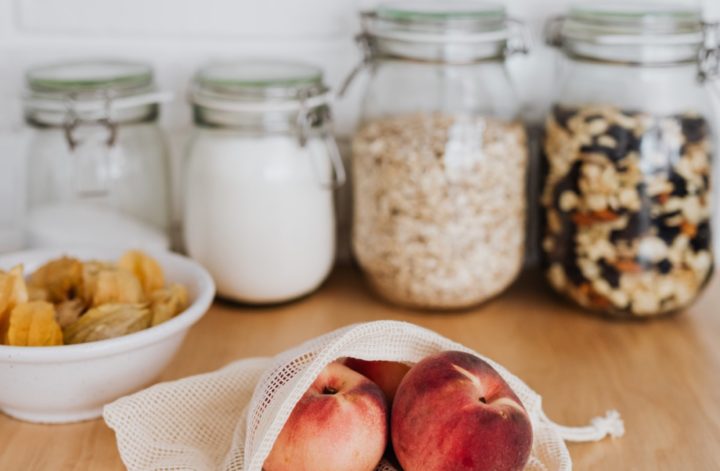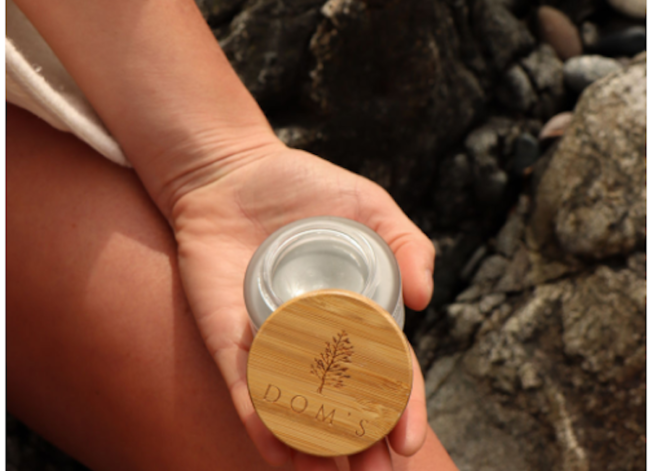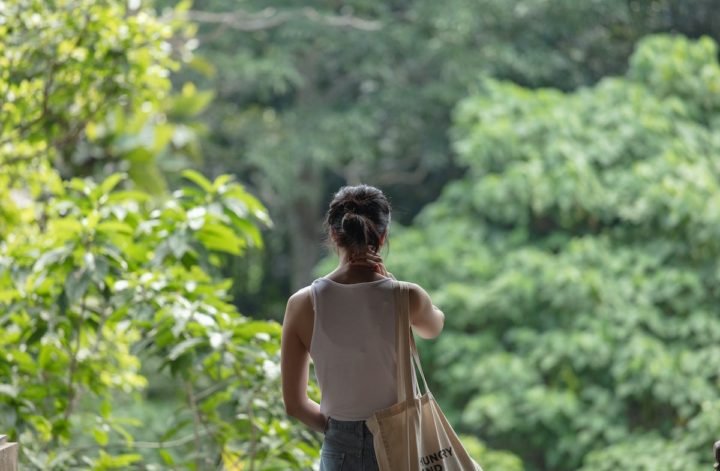Many of our kitchen products, food, utensils, cleaners and cleaning tools either come in plastic or are made of plastic, making the very thought of moving towards a zero waste kitchen overwhelming. The good news is, there are many sustainable products on the market, so don’t sweat it if there isn’t a zero waste or bulk store near you.
Typically, what comes to mind when converting your kitchen to zero waste is swapping in reusable straws or buying products in bulk. But there are so many ways to go sustainable in your kitchen. Here are a few simple and budget-friendly swaps.
Wooden Dish Brushes
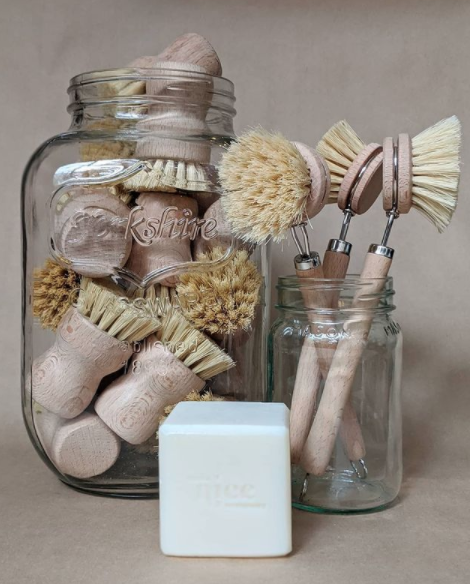
Scrubbing your pots and pans with a plastic dish brush is a pain in itself. Even worse, small bits of plastic (microplastics) flake off during the process!
Wooden dish brushes are a great alternative to plastic brushes. They come in various shapes and sizes perfect for all of your cleaning needs. A personal favourite is this dish brush and scrubber brush from Make Nice Company. The brush bristles are made of tampico (from the agave plant) and the handle is made of beechwood. Not only are they compostable at end-of-life, but the dish brush has a replaceable brush head – no plastic and minimal waste!
Swedish Dishcloths (Sponge Cloth)
Swedish dishcloths are a great swap for paper towels and sponges. One cloth can replace up to 17 rolls of paper towels. They can absorb over 20x their weight making them great for cleaning up spills or wiping up messes without leaving streaks. I personally love the patterns and quality of these dishcloths.
To clean, simply toss them in the dishwasher or the laundry, then let them air dry. To dispose of, simply toss these plant-based cloths in the compost!
Dish Soap Bar
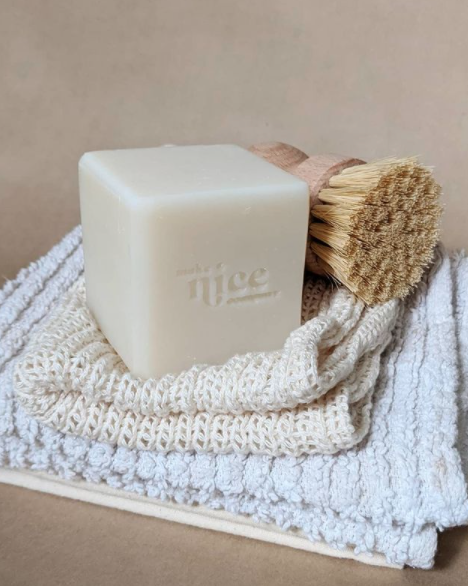
A simple and easy zero waste kitchen swap is to use a solid dish soap bar instead of liquid soap sold in plastic bottles.
This solid dish soap bar from Make Nice Company is made with three ingredients, is vegan, and paraben-free making it one of my favourite kitchen swaps! Simply rub your dish brush or cloth on the soap bar to lather and start scrubbing. To extend the life of your dish soap bar, use a soap tray that allows excess water to drain and the soap to dry in between uses.
If a dish soap bar isn’t your jam, check your local refillery to refill your bottle or buy concentrated liquid soap that uses less packaging and less transportation energy.
Glass jars
A zero waste kitchen essential! Glass jars are great for almost everything. They’re easy to clean, create a great seal to keep food and don’t leach toxic chemicals. I love using jars to store bulk food items because I can easily see what needs to be refilled on my next shopping trip.
The truth is, glass has a high environmental footprint because it requires a lot of energy and water to manufacture. Glass is easily recyclable. However, it’s best to keep reusing glass jars for as long as possible to reduce the carbon emissions produced during both the recycling and manufacturing processes.
Sustainable Food Wraps
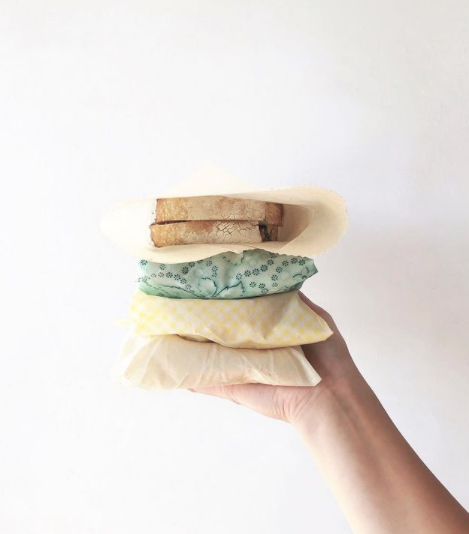
Beeswax food wraps are a great food storage alternative to plastic wrap and foil. The food wraps are breathable keeping food such as cheese, fruits and vegetables fresher for longer. They are flexible and easily formed around any size and shape of food or containers.
These sustainable beeswax food wraps from Alisa Yao are made from cotton, beeswax, organic coconut oil and pine resin. The beeswax is naturally antibacterial and prevents your food from prematurely spoiling. To clean, simply rinse the food wrap with cold water (and mild soap if necessary) and hang to dry. With proper care, your food wraps can be reused for up to one year, making them worth the upfront investment.
Cloth Produce Bags
It seems plastic packaging and bags can be found almost anywhere in the grocery store.
A great way to avoid plastic on your next grocery shopping trip is to bring your own reusable cloth produce bags and grocery bags. Refuse plastic bags unless necessary, or if you do need one bring them with you on your next shopping trip. Another option is to reuse them for trash bin liners instead of buying new ones.
Reusable Snack Bags
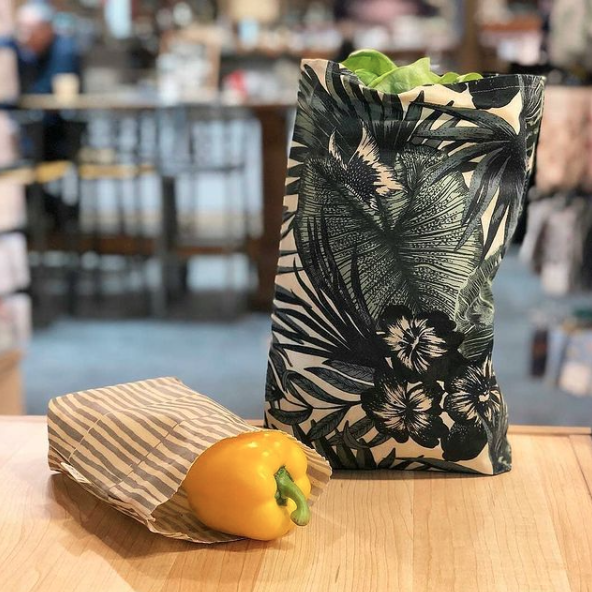
Swap out disposable plastic Ziploc bags for these one-of-a-kind beeswax snack bags. These reusable snack bags are made from cotton fabric infused with 100% pure beeswax, organic coconut oil and pine resin. The snack bag comes in regular or large size and can double as a bread bag or lunch bag. A personal favourite because they are reusable and multi-purpose!
The antibacterial and water-resistant properties of beeswax provide a great alternative to Ziploc or plastic wrap for packing your snacks on the go. To clean, wash with cool water and mild soap and hang dry. One bag will last up to 6 months and can be cut up and composted at end-of-life.
Silicone Baking Sheets
Ditch the single-use parchment paper and invest in a reusable silicone baking mat. Silicone baking mats replace hundreds of pieces of parchment paper and will keep your food from sticking to the pan.
Bonus: not having to buy parchment paper will not only help save on environmental resources but will save you money in the long run. It’s a win-win.
Avoid Single-Purpose Kitchen Gadgets
We’ve all seen them in the impulse section at the store or featured on infomercials – the single-purpose kitchen gadget we know we should avoid, but can’t.
It’s normal to want to make our kitchen tasks easier but do you really need a banana slicer or an avocado pitter? These products have one purpose – slicing your banana or removing the pit of your avocado.
Not only bad for the environment but are usually a waste of money. Save your cash and get creative using the utensils you already have in the kitchen.
Note that there are partners and or affiliate links included in this guide. As always, these products meet high standards for sustainability and are from brands I believe in!

